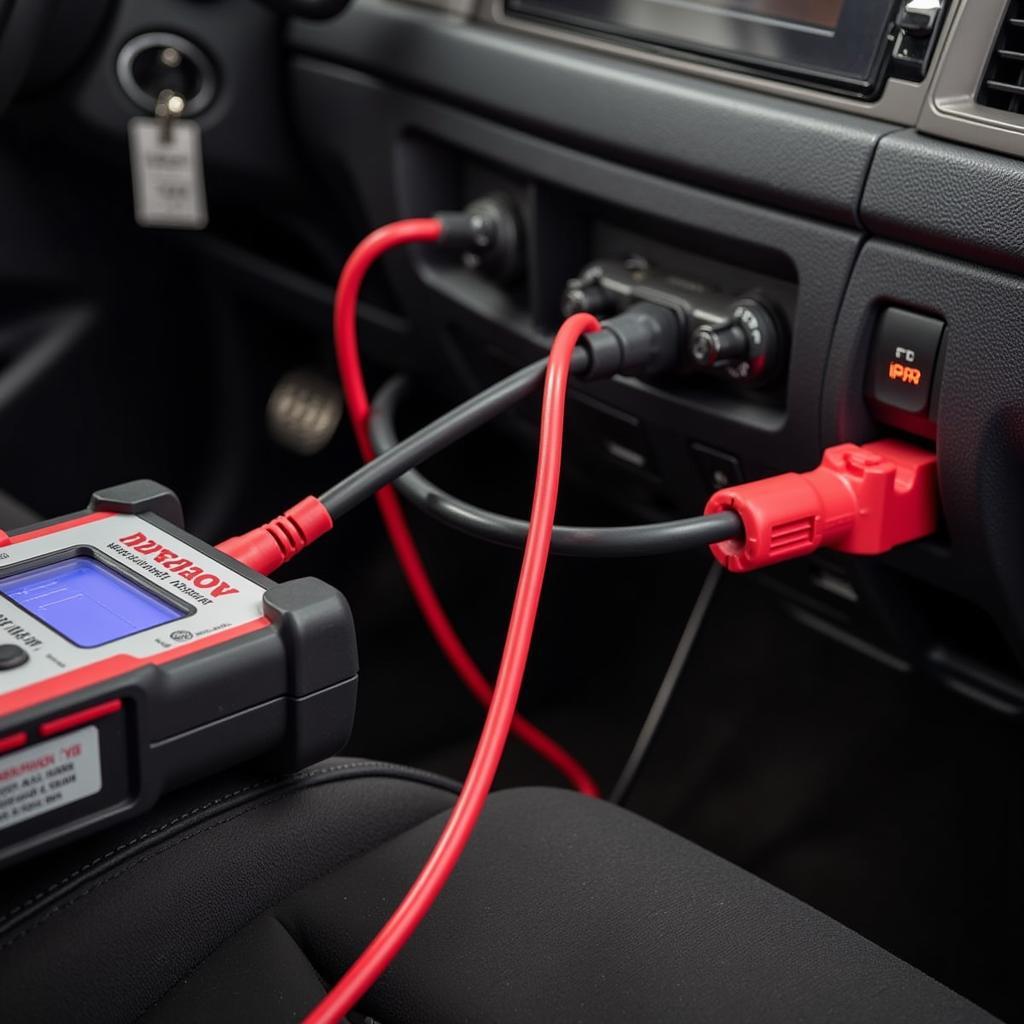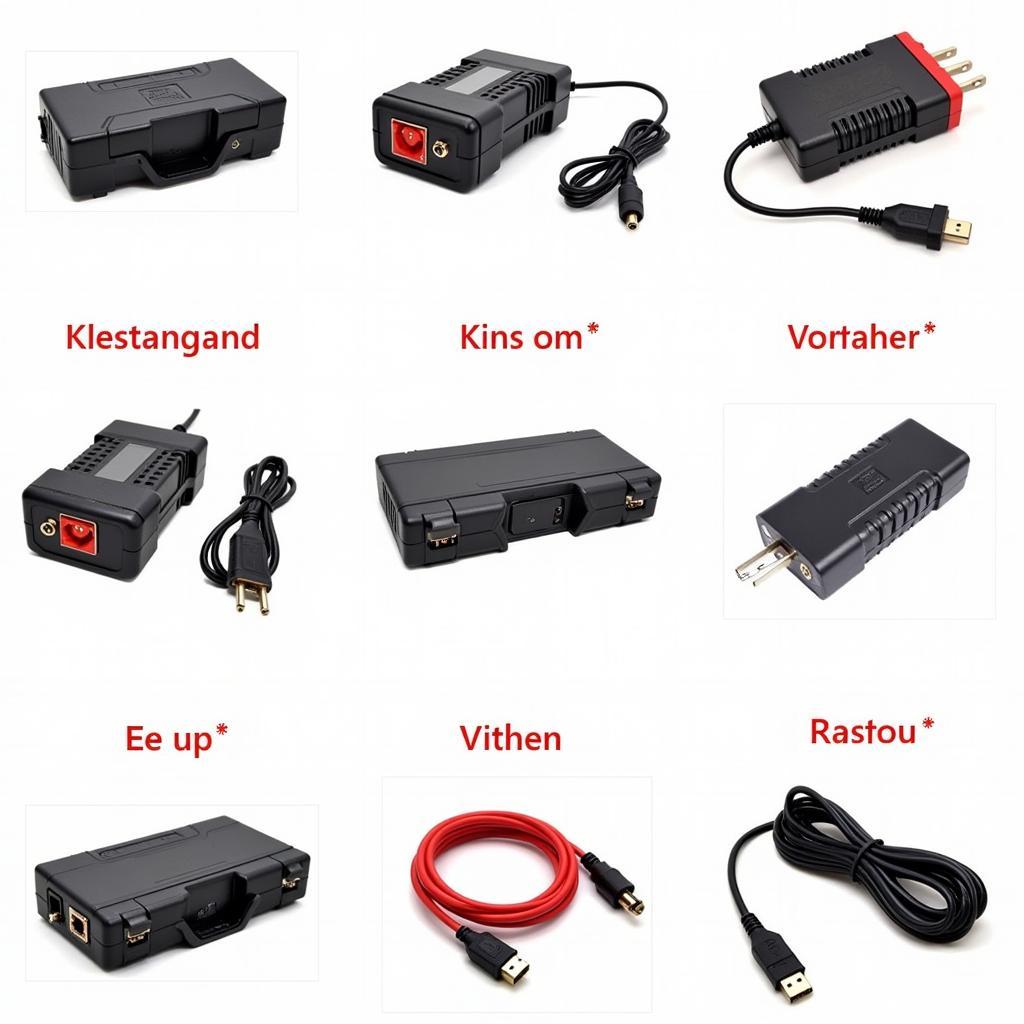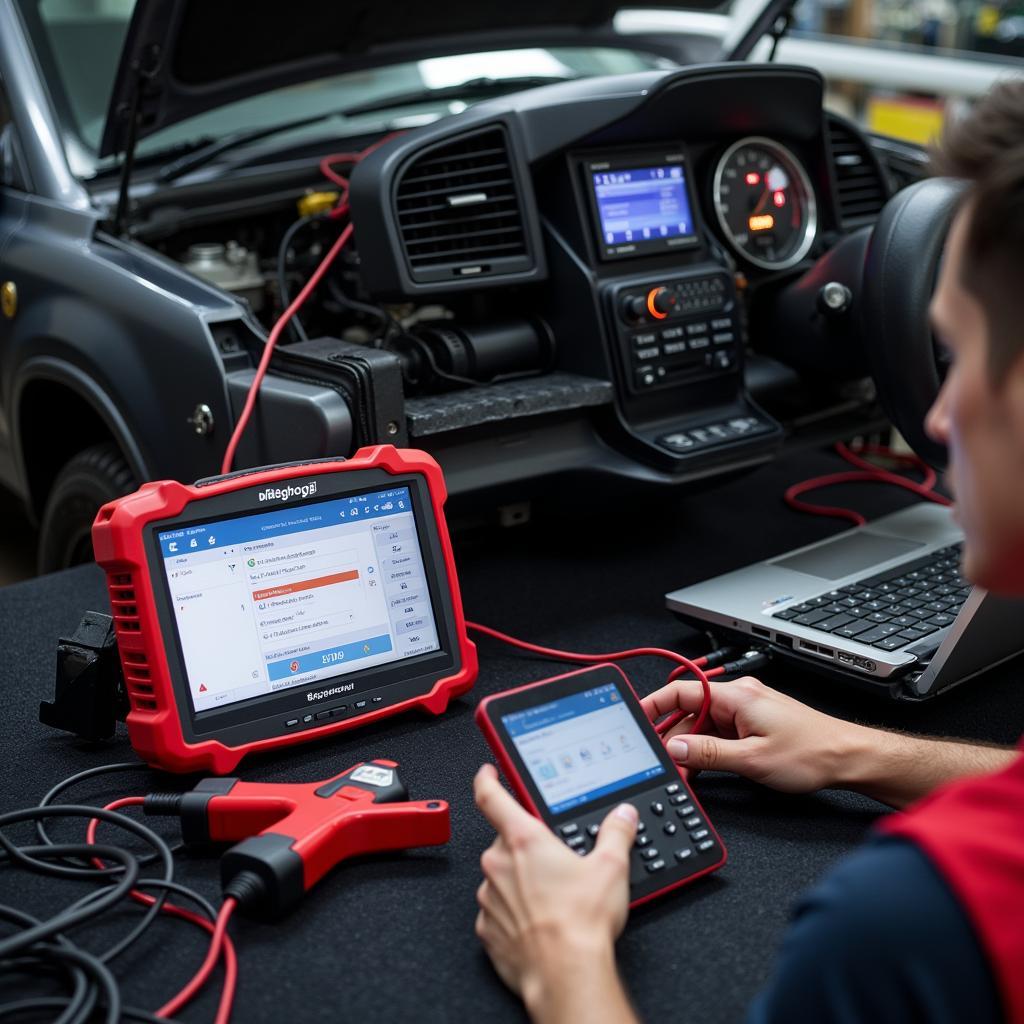A Car Diagnostic Power Supply might not be the most glamorous tool in your kit, but it plays a crucial role in keeping your diagnostics running smoothly. Whether you’re a seasoned mechanic or a DIY enthusiast, understanding the importance of a reliable power supply can save you time, money, and frustration in the long run.
Why is a Car Diagnostic Power Supply So Important?
 Car Diagnostic Power Supply in Action
Car Diagnostic Power Supply in Action
Modern vehicles are increasingly reliant on sophisticated electronics. From engine control units (ECUs) to complex infotainment systems, a stable power supply is essential for accurate diagnostics. Here’s why:
-
Preventing Voltage Drops: When using a diagnostic tool, the vehicle’s battery can experience voltage drops, especially during lengthy procedures. These drops can lead to inaccurate readings or even interrupt the diagnostic process. A dedicated power supply ensures a consistent voltage, preventing interruptions and ensuring reliable results.
-
Protecting Sensitive Electronics: Today’s vehicles are packed with sensitive electronics. A sudden power surge or drop can damage these components, leading to costly repairs. A car diagnostic power supply acts as a buffer, protecting your vehicle’s delicate electronics from potentially harmful voltage fluctuations.
-
Working on Vehicles Without Batteries: There are times when you might need to diagnose a vehicle with a dead or disconnected battery. A car diagnostic power supply allows you to power up the vehicle’s electrical system, making it possible to perform diagnostics even without a functioning battery.
Choosing the Right Car Diagnostic Power Supply
 Different Types of Car Diagnostic Power Supplies
Different Types of Car Diagnostic Power Supplies
Not all car diagnostic power supplies are created equal. Here are some key factors to consider when choosing one:
-
Voltage and Amperage: Ensure the power supply matches the voltage and amperage requirements of your vehicle’s electrical system.
-
Protection Features: Look for features like over-voltage protection, over-current protection, and short-circuit protection to safeguard your vehicle’s electronics.
-
Portability: Choose a power supply that’s easy to move around your workshop or garage.
-
Display and Controls: A clear display and intuitive controls make it easier to monitor voltage and amperage.
Common Applications of Car Diagnostic Power Supply
 Mechanic Using Car Diagnostic Power Supply for Programming
Mechanic Using Car Diagnostic Power Supply for Programming
A car diagnostic power supply proves invaluable in various scenarios:
-
ECU Programming: When flashing or reprogramming ECUs, a stable power supply is critical to prevent data corruption and ensure a successful programming session.
-
Module Replacement: After replacing modules, a power supply helps to initialize and test the new module before connecting it to the vehicle’s battery.
-
Diagnostics on Vehicles with Electrical Issues: A power supply allows you to diagnose electrical problems even when the vehicle’s battery is drained or faulty.
Car Diagnostic Power Supply vs. Jump Starter: Understanding the Difference
Many people confuse car diagnostic power supplies with jump starters. While both provide power to a vehicle, they serve different purposes.
Car Diagnostic Power Supply:
- Purpose: To provide a clean and stable power source for diagnostics and programming.
- Output: Typically delivers a constant voltage and amperage.
- Protection: Offers multiple protection features for sensitive electronics.
Jump Starter:
- Purpose: To provide a high current surge to start a vehicle with a dead battery.
- Output: Delivers a high current burst for a short duration.
- Protection: May have limited protection features compared to power supplies.
For professional diagnostics and programming, a dedicated car diagnostic power supply is essential.
Invest in a Reliable Power Supply
A car diagnostic power supply is an indispensable tool for anyone serious about vehicle diagnostics and repair. It ensures accurate readings, protects sensitive electronics, and allows you to work on vehicles with electrical issues. By investing in a quality power supply, you’re investing in the efficiency and accuracy of your diagnostic work.
Looking for car diagnostic services in your area? Check out our car diagnostic near me page to find a trusted provider. Need a versatile diagnostic tool? Explore our recommendations for the best universal diagnostic machine for a car.
Frequently Asked Questions
Q: What is the typical voltage range for a car diagnostic power supply?
A: Most car diagnostic power supplies offer a voltage range of 12V to 14.8V to match the requirements of standard automotive electrical systems.
Q: Can I leave a car diagnostic power supply connected to a vehicle for extended periods?
A: It’s best to consult the manufacturer’s instructions, but generally, it’s not recommended to leave a power supply connected for long periods unless it’s specifically designed for trickle charging.
Q: What happens if I connect a car diagnostic power supply with the wrong polarity?
A: Connecting a power supply with reversed polarity can cause significant damage to the vehicle’s electrical system. Always double-check the polarity markings before connecting.
Q: Do I need a car diagnostic power supply for DIY diagnostics?
A: While not strictly essential for basic diagnostics, a power supply can be beneficial for DIYers who frequently work on vehicles or perform more complex procedures.
Q: Can a car diagnostic power supply be used as a battery charger?
A: Some car diagnostic power supplies may have a trickle charging feature, but they are not designed to be primary battery chargers.
If you’re looking for reliable car diagnostic services in specific locations, you can find qualified professionals in Ford London or Great Yarmouth. We also have a highly skilled technician, Martin Marquis, based in Rutherglen, who can assist you with your car diagnostic needs.

Leave a Reply